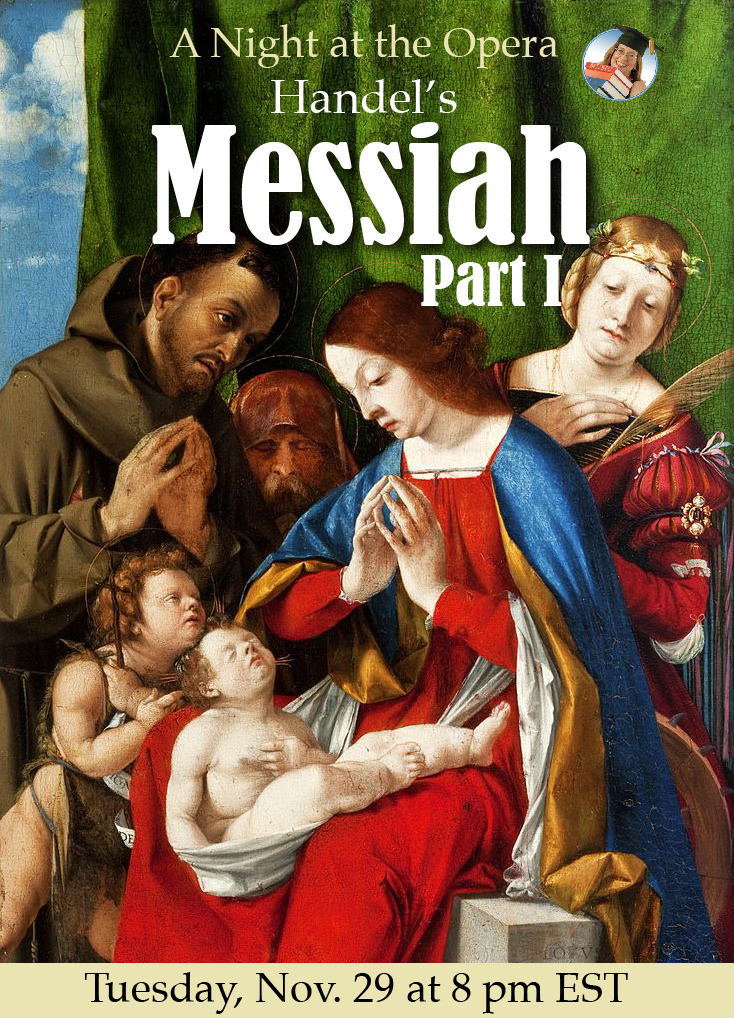If The Messiah and The Nutcracker went head-to-head, which one would be accorded the title of most famous masterwork? That’s a hard choice.
Indeed, we are about to enter the season when both dominate performance venues across the globe. They are radically different works in style, draw different audiences with similar loyalties and passion, and yet each is crowned as an essential part of the Christmas season.
“Essential” may go too far, although I am sympathetic to that descriptive. The ability to mount performances of these two works testifies to the artistic vitality of a given community. As much as I long for audiences to embrace other iconic works (e.g. Menotti’s Amahl and the Night Visitors), it is a miracle that an 18th-century oratorio and a 19th-century Russian ballet continue each December to draw crowds who may not otherwise attend theatrical performances.
Messiah Webinar: Tuesday, November 29 at 8:00 Eastern.*
I’ve long wanted to offer a session on Messiah as part of our “A Night at the Opera” series. The oratorio’s popularity with listeners continues to soar. Academics and general writers, too, recently have been producing a surprising number of books discussing the work. In short, Messiah is far from a “dusty” sentimental work that people haul out at Christmas.
This session also will mark the second time the score to an oratorio sits on our virtual podium. Do note, though, that Messiah is not so far removed from the world of opera, filled as it is with music rooted in the prevailing operatic trends of Handel’s day.
Handel’s Messiah (1742) is bit unusual when compared with the majority of popular Baroque oratorios. For starters, oratorios generally were cast in two parts, but Messiah has three. Oratorios narrated a focused story with distinct roles (characters) for the singers, although without costumes or stage acting. Messiah, on the other hand, poetically contemplates an extended story, the singers do not assume the role of characters, and it ends with a philosophical reflection on redemption and the Resurrection.
Messiah was the sixth in the string of Handel’s oratorios written for English audiences, the successes of which revived his career. Still, he’d be astonished at the reputation Messiah enjoys today. That reputation begs the question: How could an anomalous oratorio, dashed off for a limited purpose, become such an internationally acclaimed cultural icon? This is one of the many questions we will answer during our exploration of Part I of Messiah (the Christmas part) on November 29th.
So, I hope you can join me for November’s edition of “A Night at the Opera Oratorio.” Between now and then, your focus and ours will likely be on cranberry sauce, dressing, and turkey. I’m as shocked as you are to see Thanksgiving directly in front of us. Why, there’s barely time to leaf through magazines to clip indispensable new recipes that probably will not get made!
There is enough time, though, to dig out those vintage Pilgrim figurines I bought four years ago at Goodwill, but have yet to set up on my dining table. They would look so nice with my turkey-shaped gravy boat, if only I could find it before mid-January!
Please register for the Messiah Webinar.
*Sessions of “A Night at the Opera” are recorded for later viewing at your convenience.





Two years ago, we sat in the concert hall at New York’s Lincoln Center and listened to the entirety of Handel’s Messiah, performed by the New York Philharmonic and a grand chorus and excellent soloists. And I realized that I had never listened to the entire oratorio in one sitting, “live”. It was a memorable evening, and hearing the components of Handel’s great work in one long, sweeping progression, rather than in pieces, lifted the work to a new level for us. I LOVE the Nutcracker, and I think it is more accessible to a wider range of listeners, especially the very young; but the Messiah offers rich rewards, including a spiritual depth that Tchaikovsky was not trying to achieve when he composed his astounding score. It is natural to compare them as the two towering achievements of the season, but each shows us something very different and each represents the greatness of two very different composers.
While I love the Nutcracker and enjoy it’s Christmas theme (my oldest daughter was in it every year for 9 years, from age 9 – 18, playing mice, soldiers, flowers, snowflakes, etc, even the sugarplum fairy eventually; and her nieces will begin the tradition at her old studio this season, so we’re excited to be going back), I think there’s no comparison to Handel’s Messiah, which of course focuses our attention on the Lord ~ which of course is what Christmas is truly all about. :-) As Jim Weiss above said, “the Messiah offers rich rewards, including a spiritual depth that Tchaikovsky was not trying to achieve when he composed his astounding score.” I’m so looking forward to your “Night at the Oratorio” on the Messiah! Blessings, Kay